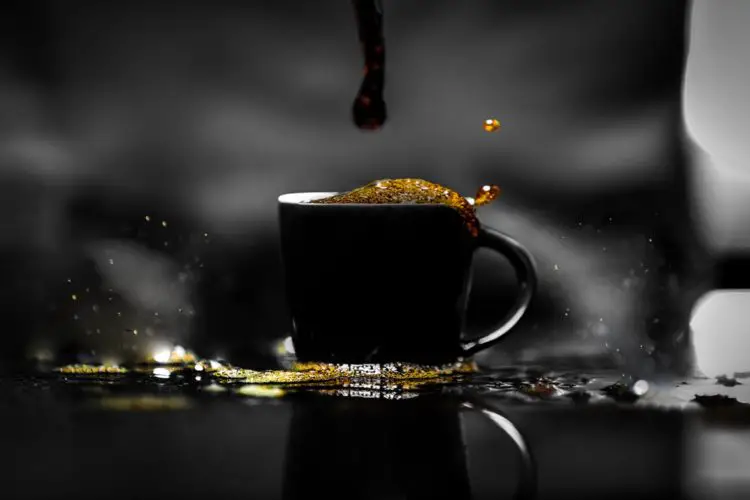Regular coffee drinkers don’t often experience this problem. Unless they buy in bulk and have coffee that’s been stashed in their pantry for several months. Does coffee go bad? You might be wondering this yourself if you were gifted a seasonal variety of something, tried it once, and then forgot about it until you ran out of your usual coffee.
Yes, coffee does go bad. But it’s certainly not the same as if you let milk spoil for example. You’re not going to die but with old coffee, the taste will be so unbearable, you won’t want to carry on with drinking it.
When you don’t store your coffee properly, even if you are drinking it with absolute regularity, you can expect humidity and other factors, like oxidation, to have an impact on how it tastes. Coffee does have a shelf life and while it’s not going to send you to the emergency room or keep you on the toilet for days to consume coffee that’s gone bad, you’ll want to avoid it so you can always enjoy the best coffee.
Read on and you’ll discover the best ways to store coffee and how to know if you should chance brewing older stuff or toss it in the trash.
Does coffee go bad?
You might be the kind of person that brews coffee at home on weekends, opting to grab your cup from a place on the way to your office. Or perhaps you spotted a good deal and decided to go overboard with your coffee purchase. Regardless of the reason, you’re here now and wondering, does coffee go bad?
As mentioned, yes, it totally does. And as mentioned, you won’t die from it but the unsavory taste may make you wish you did. That’s why keeping your coffee fresh is so important. Keep reading and you’ll find out how to know if your coffee is no longer good and how to keep your coffee fresh for as long as possible. Spoiler alert: stop buying giant bulk bags. No matter how much you love that roast, it’s better to make smaller purchases more often for the sake of freshness unless you don’t care about your coffee.
Coffee contains about a thousand different compounds in its makeup, whether it’s still in a bean or all ground up. There are amino acids, lipids, carbohydrates, and plenty more. As time marches by, those compounds begin to change. When they change, it makes the aroma of your coffee as well as the flavor of it change too. The lipids get rancid, the organic compounds evaporate, carbs get stale, and everything changes with the exposure to oxygen or water. Even the slightest changes can make a major impact on how your coffee tastes.
The length of time your coffee lasts will all depend on a number of things. For one, if you buy your coffee ground, STOP. Please, just stop that. You’re missing out on what makes coffee so spectacular. Instead of buying it ground, go buy a grinder and get whole beans. You will kick yourself for not doing this sooner, especially if you think you can’t have that coffeehouse flavor in your own house. Another spoiler alert: you CAN!
The other key component here is how you store it. If you want it to stay fresh for as long as possible, you need to put it in an airtight container, preferably something opaque where sunlight can’t get to it. You’ll also want it to be in a cool, dry, and dark place. When you keep it stored like this, you can use it in ground form even for a few months after the expiration date. Though our top recommendation is to get whole beans and only grind them as needed.
For whole beans, you can store them in this fashion and expect them to last up to 9 months. Instant coffee can last for 20 years, though instant should only be resorted to in an absolute emergency or for those one-cup moments.
Some say to put it in your freezer. The debate is huge on this but we tend to side against it. Freezing coffee tends to destroy the flavor. You lose those interesting nuances that make the flavor profile so spectacular. When you thaw it out, it just tastes dull and uneventful. Don’t you want your coffee to perk you up?
It depends on the type of beans, the roast, and how you brew it for getting that peak flavor though your best outcome is to always use coffee that has been roasted recently. This is different from the roasting date. The expiration date on your coffee beans is usually a year from the date of the roasting. So, the closer you are to the expiration date, the less fresh your coffee will be and the taste will be just meh.
Let’s say you bought coffee that you’re not sure when you’re going to use. Perhaps you’ve grabbed up some decaf ahead of a dinner party or to keep around for when older relatives come for dinner intermittently and don’t want caffeine to keep them up all night. In that case, keep it sealed until you’re ready to use it. If your decaf-drinking guests don’t come all that often, consider buying the smallest amount and replenishing it as needed to treat them to the freshest possible brew.
Most coffees, caffeinated and decaf, have nitrogen to keep spoilage to a minimum but when that seal is broken, you allow oxygen and humidity in which can reduce the flavor of those beans. So, in short, the fresher the coffee, the better it is. To increase your chances of having fresh coffee, buy whole beans as close to the roasting date as you can and only grind up what you need.
Give your coffee a sniff to be sure. If something smells off or you notice mold or mildew, throw it away. If it simply smells flat, you’ll just have coffee that tastes flat. It won’t make you ill but you’ll be disappointed in the flavor. You really can’t get sick from bad coffee though if you do see mold or mildew (or detect it when you take a whiff of the beans), don’t chance it. No good can come from it. This isn’t blue cheese, after all!
Oh, but you need coffee and the last of it smells flat and blah. Go ahead and make it but don’t say we didn’t warn you. Instead, grab one at a café and treat yourself. Then restock your beans with fresh ones for tomorrow’s brew. When it comes to coffee, fresh is ALWAYS the best option.
Why does your coffee taste bad?
Do you ever think about how rust forms? It happens when iron oxidizes. While coffee won’t rust, it does oxidize all the same. Instead of rust, it simply becomes very stale. The more exposure it has to oxygen, the more quickly it will go stale and taste bland. Heat and moisture also speed up oxidation. You’ll know it when you take a sip from your favorite coffee mug and find bitter or rancid-tasting coffee akin to the waiting room and gas station coffee all over the country. Nothing you can do in the way of brewing will save it. You’ll have to throw it away and get new, fresh beans for your coffee.
Don’t punish yourself. Instead, keep reading to find out how to tell if your coffee has gone rancid.
How to tell if your coffee is rancid
When coffee is someplace humid (think Florida), it will absorb water from the air and then go bad. You will soon see mold too and you’ll need to throw it away. Always keep tabs on your coffee. Keeping it in a cool, dry, and dark place in an airtight confine will always yield the best result. Don’t just scoop blindly. Take a good look and smell the container. If something smells funky, ditch it immediately.
And if something does smell off, whether you live in humid Florida or somewhere bone-dry, it can still happen to you. Read on and you’ll know how to store your coffee to keep it as fresh as you can.
How to store coffee
Coffee should always be stored in a cool, dry, and dark place. Your pantry is ideal for this or a kitchen cabinet. They say if you freeze your beans, they will keep longer but do know that that process will lessen the flavors of the coffee. Besides, do you really have enough real estate in your freezer between the steaks and frozen pizzas? We didn’t think so.
An airtight container is always the best bet for any opened coffee that is ground or instant. You shouldn’t be grinding more than you need, but it does happen. If you have a small kitchen scale, you can measure out what you need. Most people don’t though and they do wind up grinding more than they need for the day. Having a little extra isn’t a big deal. You can always use it for tomorrow’s coffee, but you should store it promptly in an airtight container so it tastes nice and fresh when you make it. Cans and jars are great for this though they should be kept out of the sunlight.
How to keep your coffee fresh
So, if you don’t want to wake up to find your coffee has gone bad, or even worse, serve guests bad coffee, you should take a few steps to keep your coffee as fresh as you can for as long as you can. Here’s how to do just that!
– Remember that coffee expires
When you open a new bag of coffee, think of it like a loaf of bread. The more air it comes into contact with, the less fresh it will be. Bread should be soft and airy in texture. Even those loaves you buy for the kids’ lunches. But once you open those up, they tend to get firmer and taste less delicious. Your coffee is very much the same. Don’t let it come into contact with air. Put it promptly in an airtight confine and use it as quickly as you can. Don’t buy those bulk bags either unless there are tons of coffee drinkers in your household. Otherwise the coffee goes stale and you’ll be stuck throwing it away. If you do buy a bag and don’t open it, it will keep for about a year, but that flavor won’t be as wonderful as it is when you use it closer to the roasting date.
– Prevent freezer burn
Again, there are some folks who think putting coffee in the fridge or freezer is a smart idea. Whether it’s whole or ground though, this won’t help extend its longevity. It will more than likely create a freezer burn and make your coffee taste very bland.
– Stop oxidation
The moment you open your package of coffee, the air will enter and begin the oxidation process. Clip the bag immediately to keep the package sealed tight. You can also take that clipped bag and stick it in a large, zippered bag. Ideally though, pouring your coffee beans into a container that is airtight will be the best thing you can do when storing them for freshness.
Conclusion
Coffee can go bad and when it does, it’s not delicious. Generally, coffee that goes bad just has little to no flavor. But on the extreme end, you could wind up with mold or mildew. It’s important to always inspect your coffee before grinding it and brewing it. Grounds are even more susceptible to molding, especially in humid environments. This is why storing your coffee the right way makes all the difference.
If you want the best coffee every morning, follow these tips to ensure every cup you have is as heavenly as it should be!

